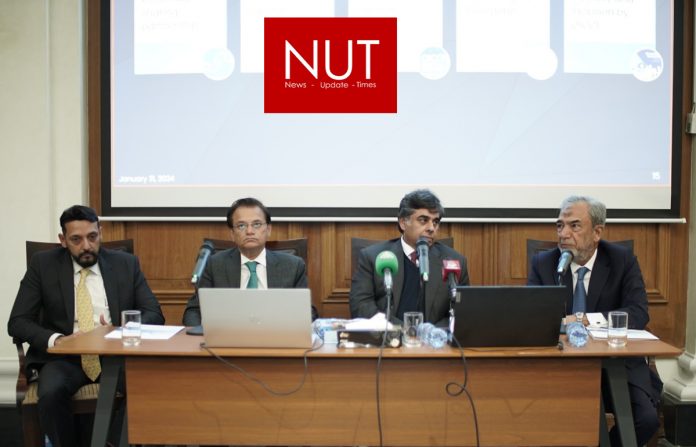Pakistan (Muhammad Yasir)
Dr Gohar Ejaz, minister for commerce and interior, along with Board of Investment (BoI) Secretary Sohail Rajput, visited the Overseas Investors Chamber of Commerce and Industry (OICCI) on Wednesday to engage with foreign investors and discuss critical issues affecting Pakistan’s business landscape.
During the meeting, OICCI CE/Secretary General M Abdul Aleem delivered a comprehensive briefing to key officials on survival challenges faced by foreign investors in Pakistan. Recent survey conducted by the Chamber highlighted key concerns for existing investors part of the Chamber’s membership, with rupee devaluation, inflation, the cost of doing business in Pakistan and increasing tax burden being identified as the top pain points.
Despite these challenges, the secretary general emphasized the significant achievements of OICCI members, who have collectively reinvested $22 billion in Pakistan from fiscal year 2013 to 2022, surpassing the net FDI inflows of $19.9 billion during the same period.
In his remarks, Dr Ejaz said that the caretaker government worked day and night to identify the problem areas that were bleeding the economy, one of which was the leakages through the Afghanistan-Pakistan Transit Trade. He urged foreign investors to focus on the country’s potential. “Pakistan is poised to be a one trillion-dollar economy,” he added.
The meeting also addressed some of the sector-specific challenges, with the Pharma sector facing issues related to pricing policy adherence and overlooked patents during registration by DRAP. The telecommunication sector highlighted concerns about spectrum pricing in US dollar and a regressive and highest taxation on telecom in the region. Moreover, the oil and gas sector raised issues such as delay in timely margin revisions and deregulation challenges. The Chamber also proposed specific areas where the Ministry of Commerce (MoC) and BoI could collaborate to improve the ease of doing business.
The Chamber suggested measures to reduce the number of regulators and regulations, with a focus on a transparent policy framework and its consistent application, ensuring no surprises either on tariffs or other regulatory matters.
“To promote Pakistan as an investment hub, a proactive presence at key international forums and in international media, along with effective communication by Pakistani diplomats and trade officers abroad, is the need of the hour,” said Abdul Aleem.
To attract FDI, the proposal also urged quarterly global press engagements by the prime minister to address negative perceptions and the establishment of help desks with designated relationship managers at BoI, both at the federal and provincial levels. The visit concluded with a focus on ongoing collaboration to implement reforms that would ensure a visible impact on investment promotion and ease of doing business in Pakistan.






